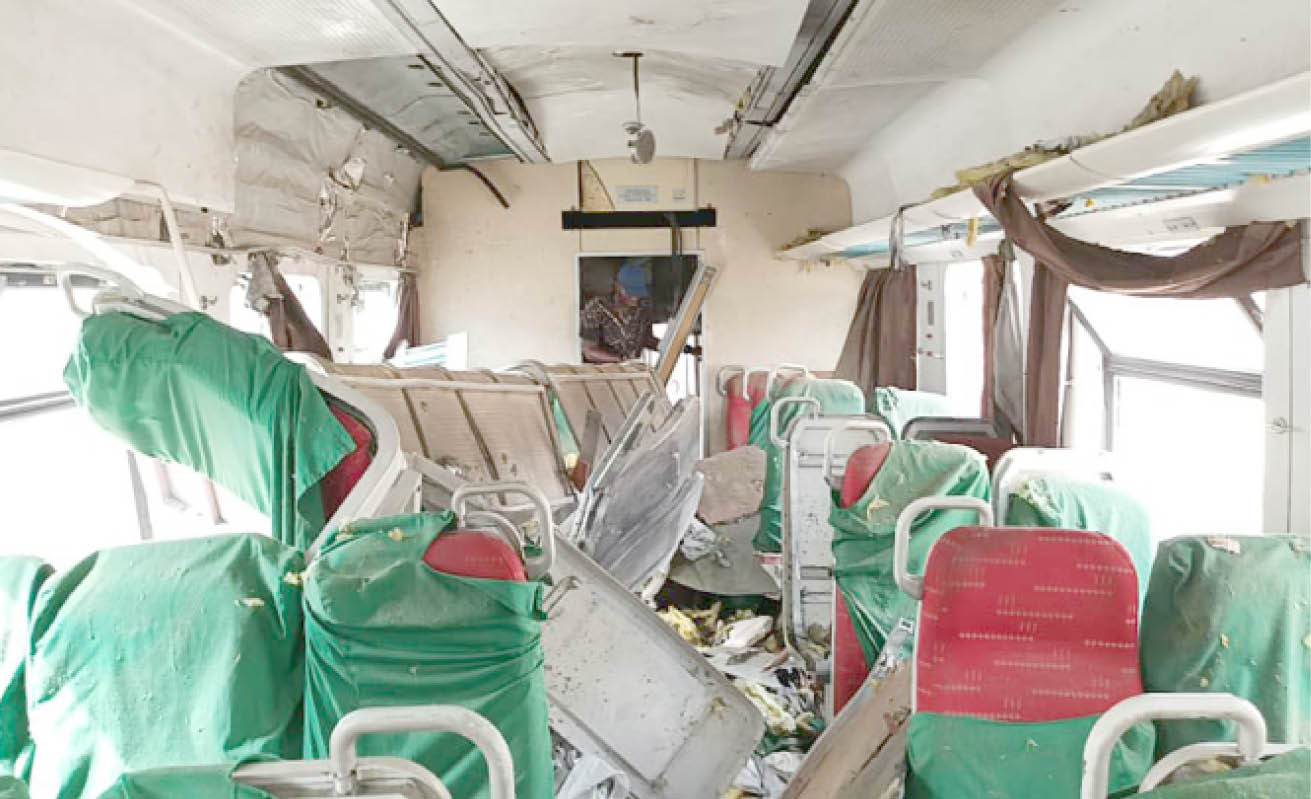Living with the Kaduna train bomb attack tragedy
Whilst in many other countries rail travel is probably the first option, in Nigeria today people just hear about it. It was once popular many years ago. But I guess most Nigerians under the age of 70 might never have traveled by train in this country. Even myself, who is fast approaching that venerable milestone, […]

Train attack
Whilst in many other countries rail travel is probably the first option, in Nigeria today people just hear about it. It was once popular many years ago. But I guess most Nigerians under the age of 70 might never have traveled by train in this country. Even myself, who is fast approaching that venerable milestone, has not set foot on a train in this country for some 45 years now. Many of my contemporaries would likely tell you the same thing. Probably it has taken all those years for our railways to degenerate into this abyss.
When I was growing up in Maiduguri in the 1960s it was a treat to travel by rail. Train services reached Maiduguri in 1964 and three years later I was privileged to start using its services going to college in Keffi some hundreds of miles away from my home.
Travelling to Keffi by road was the option mostly available and in use but it was always a harrowing journey. You used those open boarded vehicles where you might be boarded with goats, sheep, and bags of dried fish and would be exposed to the elements in all seasons for two or three days. Going from Bauchi to Jos onwards the sight of those high hills dotting the landscape and the deep gorges straddling the narrow roads was frightening to us lads from the plain landscapes of the semi-desert.
Travelling by train was different. You felt housed and safer. The coaches could be jam-packed especially from Jos onwards to the south of the country, but it was exciting for schoolboys. It was a two-day journey running through the states of Yobe, down to Nasarawa stopping in Gudi Station, just fifteen miles from our college. We never had any mishaps throughout, though when we were in the fourth form in 1970, the country witnessed its worst train disaster ever.
That was the Langa-langa train disaster where an estimated 150 souls were lost. Langa-langa is a village between Akwanga and Gudi and therefore not far away from our college. It was February and we were in school. None of our college students was affected though some must have lost relations. The train was said to have taken off from Jos, had a stop at Gudi station, and later at Langa-langa, en route to Lafia-Makurdi for onward movement to the southeastern part of the country. The Gudi to Langa-langa tract is embedded into a very rocky path with endlessly rolling mountains and a very frightening view of the ravine from atop.
Those who travelled on that stretch in those days would tell you that after leaving Langa-langa the trains going to Lafia had to slow down to a crawl and meander through rocks high up and turn half circles to continue the journey. That tragic day the wagons derailed at the winding bends after Langa-langa and fell into the deep canyon. Till today the debris of the mangled wagons of the ill-fated train has not been evacuated from the deep ravine. The last victim of that disaster, Malam Adamu was reported to have died in a government hospital in Kaduna in 2013. He was 81 years old and had been nursing a spinal injury in the hospital for 43 years.
Despite the Langa-langa disaster which received worldwide attention at the time, rail travel continued unabated. However, in the 1970s due to massive spending on road construction by the Gowon regime and the nationwide introduction of buses and taxis, rail travel started to lose its luster. Sheer neglect by successive governments finally sent the rail travel option to the bottom of the transport industry. I continued to ply the railway myself but finally had to opt out. I took my last ride in 1977 after completing my national service in Lagos. I took the train that July day from Iddo going to Zaria where I was to start a career in the School of Business.
When the Abuja- Kaduna line was introduced recently, I had my misgivings and did not set my feet in it till early this year. I had just made only my third trip on that line on Saturday then tragedy fell on it the following Monday. I feel deeply for the hapless victims of that mishap. The tragedy is even more telling when we knew the series of government failings before the bandits struck. Now we are forced to live with the tragedy day in and day out because its resolution is not yet in sight. The fatalities involved and the sight of the captured circulated on social media are galling enough. We set our eyes on the government to do all within its powers to bring a resolution to this sordid affair.
From my mailbag
Wazirin Katsina: The loss and the gains
“I thank you very much for your write-ups and enjoy reading them. I also share your belief that we in Katsina are better with Ibrahim Ida’s wazirci. However, Hamza R Zayyad came from the family of Waziri Zayyana of Rafindadi Quarters in Katsina- the meaning of the R in Hamza’s name.” Aminu Galadunchi Umar
“Read your column yesterday on Wazirin Katsina. Please note that Hamza Zayyad was not from the family of Waziri Zayyan. Waziri Haruna was removed by Sarki Dikko and turbaned Waziri Zayyan.” Lawal Isa
